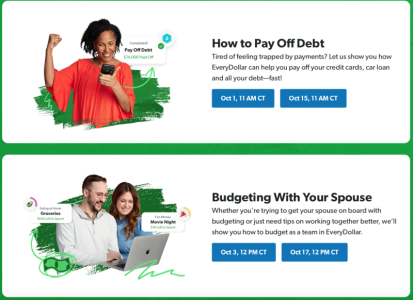Willow Ufgood
DIS Veteran
- Joined
- Sep 1, 2022
- Messages
- 566
This works for you because you have that 6 month EF making more interest than you're paying on the car loan. In Dave's world, having a 6 month EF only happens after you have paid off all debts but your mortgage. The PP's son is trying to follow DR's baby steps. In Dave's world, you don't buy new cars that depreciate as soon as you drive it off the lot. You buy beaters and drive them into the ground until you are debt free. And even then, he would advocate that you purchase a good used vehicle.DR is not entirely for us as well. I think some of his methods have merit while others can be short-sighted. with the example of a needed car purchase-we were in this situation just about 1 year ago this next month. I'm a big believer in having a healthy 'emegency fund' (6 months or better of monthly expenses). now, we could have paid cash outright for the new car we were looking at but to do so would have taken our emergency fund well below a single month's expenses. this makes me nervous. I also have our emergency fund in an interest earning account that's making 5.5%. since it was the end of the model year dealers were offering finance deals in the 3% and lower range (and with added price reduction incentives for financing). for us it was a no-brainer, we were not going to pay cash and (1) pay more for the vehicle, and (2) lose out on earning interest. yes (DR gasps) we have a car loan-and despite paying interest on it we are netting over 2 1/2% on that money sitting in the bank. it's going to be paid off VERY quickly (i'm making triple payments if not more each month) but I don't have to worry that if some other large system or appliance or expense comes up i'm sitting with next to nothing in my emergency fund and forced to use a credit card or some obscene in-store financing.
There's a lot of things that DR recommends that go contrary to what a debt reductuon consultant would advise. The first is paying just the minimum on all debts until a $1K EF is established. I went back thru posts in other threads by @WDW_fan_in_TX after responding here. I get the impression that while he has made progress by paying off one CC, life keeps smacking him in the face. Having a $1K EF would have helped but then paying off that CC would not have happened. And that's the problem for a lot of people. You can't get past BS#1 if you are constantly having to dip into it.
The next piece of DR advise that goes against conventional logic is BS#2. The snowball method has you paying off your debts from smallest to largest regardless of the interest that is accruing. He maintains that by reducing debts from smallest to largest, you are more motivated as opposed to slugging it out to pay off a larger debt with a higher interest rate and not seeing much progress. This step also takes the longest because it involves paying off all debt with the exception of your house before moving on to BS#3. Meanwhile, life keeps happening and you dip into the emergency fund, which puts you back at BS#1 until the EF has been brought back to $1K. It's a never ending cycle for some people because $1K doesn't go very far for true emergencies and you're back to using the CCs or taking out personal loans to cover the emergency.
I saw that @WDW_fan_in_TX is struggling to establish a budget that works for him and his wife. It's understandable because we have all seen the cost of necessities rise faster than our paychecks. What worked last year isn't working this year. In fact, what worked last month isn't working this month. That's why I suggested using cash for everything possible. The envelope method might be worthwhile for him but I read that instead of just using plain white envelopes, his wife ordered a fancier binder version from Amazon. And it doesn't appear that they are using it.
DR also says no to vacations when you're paying down debt. I don't agree to saying absolutely none but spending money that I didn't have in order to go to WDW would just not happen even if I were not following DR. I pointed out what that vacation is costing @WDW_fan_in_TX because it's money that could pay off another CC or go into an EF . I do believe that time off from work is important for mental health. But it doesn't have to cost the price of a WDW trip.
Last edited:


 ).
).